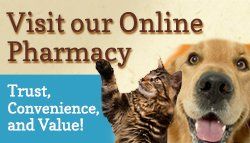Food Hazard for Pets
- By Dr. Craig Miller -
Our pets are part of our family, and as such, it's hard to not give into temptation to give them some of our food. While many foods are fine for pets as a treat, you should use caution about what you give your pet as a treat. Let's discuss some potential food hazards.
Many of our foods are high in fat, which when fed to cats and dogs can lead to diarrhea, vomiting, or pancreatitis, a serious illness that causes vomiting, diarrhea, anorexia, dehydration and may lead to diabetes. In addition, feeding too many table scraps can make some dogs picky, leading them to refuse dog food, holding out for more people food. This can make it very difficult for dogs to get all the nutrients they need for a balanced diet. Too many table scraps or treats can also lead to obesity, which is linked to heart disease, diabetes, and shorter life expectancies.
Specific food hazards include:
1. Grapes and raisins can cause kidney failure in dogs. Their toxic dose is unknown, so it is not a good idea to feed any amount of either food.
2. Macadamia nuts are toxic for unknown reasons in dogs. Dogs may develop vomiting, stumbling, tremors, and fever.
3. Garlic alters red blood cells oxygen-carrying capacity in both dogs and cats. Onions are in the same family and can cause similar problems, though they are less potent than garlic.
4. Cod liver oil is too high in vitamins A and D and can lead to toxicosis. Other fish oils are good for pets and provide health benefits.
5. Chocolate can cause vomiting, diarrhea, pancreatitis (due to the fat), hyperactivity, increased heart rates, abnormal heart rhythms, and even death. Dark chocolates are higher in methylxanthines; thus more toxic. Baking chocolate is the most dangerous, while white chocolate has the lowest toxicity.
6. The artificial sweetener xylitol has been shown to be very toxic to dogs, causing low blood sugar within 30 minutes to 12 hours, liver damage, and even death within 3 days. This sweetner is used in sugar-free baking goods, candies, and some sugar-free gums. Other artificial sweetners do not have this toxic concern.
7. Bones can lead to choking hazards, irritate, or even rupture the esophagus or intestines (such as chicken bones or T-bones). Ingestion of bone marrow can lead to constipation. Large bones can fracture dogs' teeth.
8. Raw meats can be a hazard for both our pets and us. Veterinary studies of raw foods have shown many commercially sold brands carry Salmonella, bacteria which cats and dogs may not show illness from, but will contaminate the food bowl and pass in the feces, exposing people. Raw meat can carry a variety of other bacteria and parasites. In addition, raw meats are not complete diets, and even with supplementation of vitamins and minerals it is difficult to keep these diets consistently balanced.
9. Uncooked salmon can lead to a serious disease called salmon poisoning. Salmon poisoning can kill dogs if untreated. It is caused by a blood parasite carried by a tiny fluke (worm) inside the meat of the salmon. In dogs, it can cause fever, enlarged lymph nodes, anorexia, vomiting, and death if untreated.
For further questions on which human foods may pose a risk, check out the Animal Poison Control Center (APCC) archive on people food at www.aspca.org.






